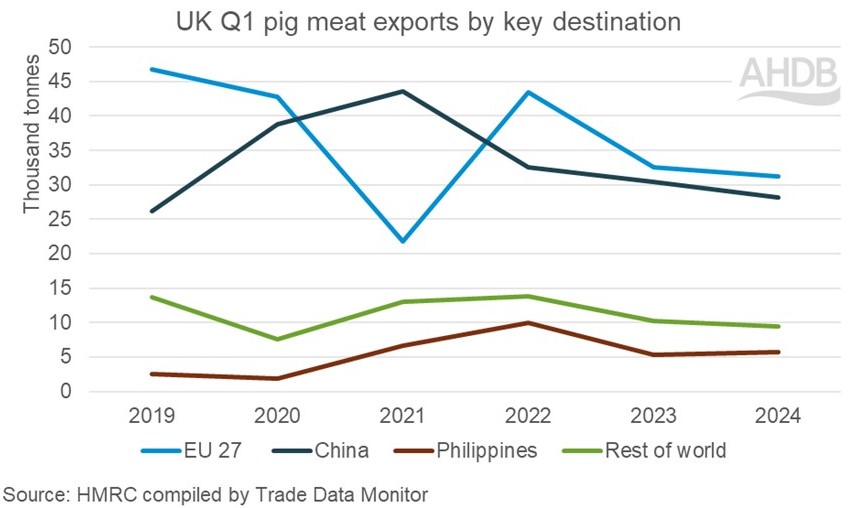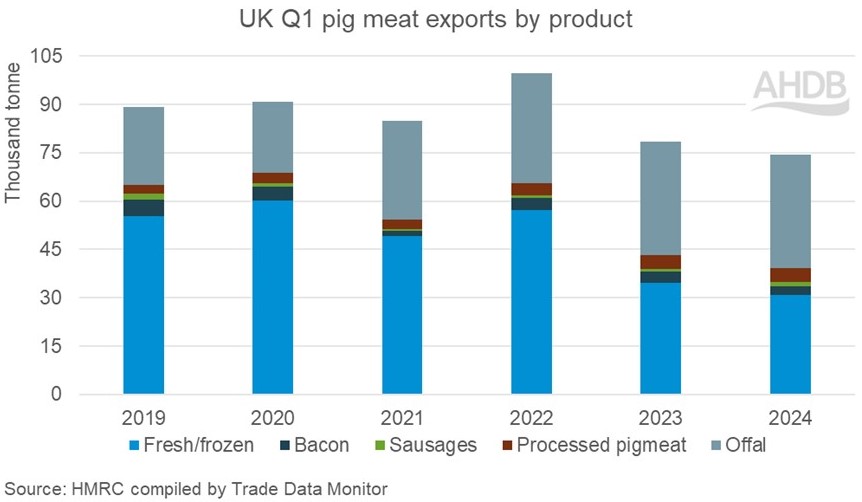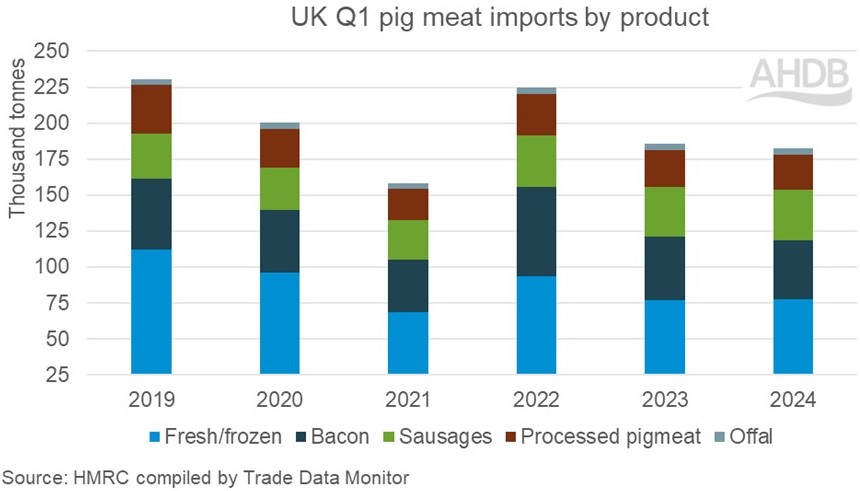UK pig meat trade: Q1 2024 volumes lower year on year
Wednesday, 29 May 2024
Key points:
- Export volumes in Q1 at their lowest since 2015
- The top four destinations for exports remain the same, but an increase in shipped volume to South Africa has changed fifth place
- Exports of offal and processed pig meat have reached the highest volumes on record
- Q1 import volumes at their lowest on record (excluding 2021)
- Sausages have recorded the second highest import volume for the category
Exports:
In March UK pig meat exports totalled 24,400 tonnes, falling compared to both the previous month and year. This brings the export volume for the first quarter of 2024 to 75,500 tonnes, a loss of 4,000 tonnes (5.1%) year on year and the lowest Q1 figure since 2015. Lower export volumes have been driven by reduced supplies.
So far in 2024 there has been no change in the top four export destinations for UK product, despite volumes falling across the board. The EU27 holds the largest market share at 42%, closely followed by China with 38%. The Philippines has recorded year on year growth in volumes, growing its market share to 8%. The US continues to hold a 2% market share, meanwhile South Africa has seen growth in shipment volumes and market share, overtaking South Korea.

Shipments of Fresh/frozen pork held the brunt of lost export volume, down 10.8% year on year at 30,900 tonnes. Bacon shipments also recorded a decline year on year, down 700 tonnes to 2,700 tonnes. Meanwhile sausages, processed pigmeat and offal all recorded year on year growth, albeit by considerably smaller volumes. For offal and processed pig meat, export volumes have continued to grow, continuing the trend seen over recent years. In Q1 2024 volumes for both categories reached their highest on record at 35,300 tonnes for offal and 4,400 tonnes for processed pig meat.

Imports:
UK pig meat imports in March stood at 60,700 tonnes, recording growth compared to February but down nearly 7,000 tonnes year on year. This brings the total import volume for the first quarter of 2024 to 182,300 tonnes, a decline of 3,500 tonnes (1.9%) compared to 2023 and the lowest Q1 volume on record (excluding 2021 when Brexit had a severe impact on trade).
Bacon and Processed pig meat recorded the largest losses in volumes year on year in Q1 2024, down 2,700 tonnes (6.2%) and 1,800 tonnes (7.3%) respectively. Fresh/frozen pork saw minor growth of just under 300 tonnes to 77,300 tonnes, while sausages recorded stronger growth, up just shy of 900 tonnes to reach the second largest volume recorded for the category at 35,300 tonnes.

Demand:
Although overall pork retail volumes show decline year on year (2.1% in 12 weeks ending 14 April), there has been some product growth seen within categories. Kantar data shows that within primary pork, total roasting, mince, belly, and ribs recorded growth. This may support some of the increased fresh/frozen imports, however the main retailers continue to have strong support for British product with our most recent survey of facings showing 88% of pork facings in major retailers were of British origin.
On the contrary, to this food service typically relies more heavily on imported product. The most recent Kantar data shows the in the 52 weeks ending 17 March, pork food service volumes are up 8.7% year on year with the strongest growth recorded in savoury pastries, with sausage rolls a key player within the category.

Sign up for regular updates
Subscribe to receive pork market news straight to your inbox. Simply complete our online form.
While AHDB seeks to ensure that the information contained on this webpage is accurate at the time of publication, no warranty is given in respect of the information and data provided. You are responsible for how you use the information. To the maximum extent permitted by law, AHDB accepts no liability for loss, damage or injury howsoever caused or suffered (including that caused by negligence) directly or indirectly in relation to the information or data provided in this publication.
All intellectual property rights in the information and data on this webpage belong to or are licensed by AHDB. You are authorised to use such information for your internal business purposes only and you must not provide this information to any other third parties, including further publication of the information, or for commercial gain in any way whatsoever without the prior written permission of AHDB for each third party disclosure, publication or commercial arrangement. For more information, please see our Terms of Use and Privacy Notice or contact the Director of Corporate Affairs at info@ahdb.org.uk © Agriculture and Horticulture Development Board. All rights reserved.

